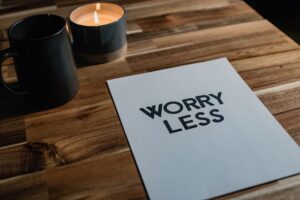“Anxiety may knock on your door, but with science-backed strategies, you hold the key to a calmer and more balanced life.”
“You are not your anxiety. You are the person who can conquer it.”
Anxiety is a normal human emotion that everyone experiences from time to time. However, when anxiety becomes chronic or overwhelming, it can have a significant impact on your mental and physical well-being. The good news is that there are science-backed strategies you can use to reduce anxiety naturally and regain control over your life.
In this article, we’ll explore nine evidence-based techniques to help you manage anxiety effectively and promote a sense of calm and balance.

1. Practice Mindfulness Meditation
The Science: Mindfulness meditation has been extensively studied and shown to reduce symptoms of anxiety. It involves paying attention to the present moment without judgment, which can help break the cycle of anxious thoughts and worries.
How to Do It: Find a quiet space, sit comfortably, and focus on your breath. When your mind wanders, gently bring your attention back to your breath. Start with short sessions and gradually increase the duration as you become more comfortable.
2. Exercise Regularly
The Science: Physical activity releases endorphins, which are natural mood lifters. Exercise has been proven to reduce anxiety and improve overall mental health.
How to Do It: Aim for at least 30 minutes of moderate-intensity exercise most days of the week. Find an activity you enjoy, whether it’s walking, cycling, swimming, or dancing.
3. Prioritize Sleep
The Science: Sleep and anxiety are closely connected. Lack of quality sleep can exacerbate anxiety, and anxiety can disrupt sleep. Establishing good sleep habits is crucial for managing anxiety.
How to Do It: Maintain a consistent sleep schedule, create a relaxing bedtime routine, and make your sleep environment comfortable and conducive to rest.
4. Limit Caffeine and Alcohol
The Science: Both caffeine and alcohol can trigger or worsen anxiety symptoms in some individuals. Caffeine is a stimulant that can increase restlessness and nervousness, while alcohol is a depressant that can affect mood.
How to Do It: Monitor your caffeine and alcohol intake, and consider reducing or eliminating them if you notice they contribute to your anxiety.
5. Practice Deep Breathing Exercises
The Science: Deep breathing exercises activate the body’s relaxation response, which counteracts the stress response associated with anxiety. Deep breathing can quickly calm the nervous system.
How to Do It: Find a quiet place, sit or lie down, and take a deep breath in through your nose, counting to four. Hold your breath for a count of four, then exhale slowly through your mouth for a count of four. Repeat this several times.
6. Cognitive Behavioral Therapy (CBT)
The Science: CBT is a highly effective therapeutic approach for managing anxiety. It helps individuals identify and change negative thought patterns and behaviors that contribute to anxiety.
How to Do It: Consider working with a licensed therapist who specializes in CBT. They can provide you with strategies and tools to challenge anxious thoughts and develop healthier coping mechanisms.
7. Maintain a Healthy Diet
The Science: The gut-brain connection is well-established, and research suggests that a healthy diet can positively impact mental health. Nutrient-rich foods support brain function and may reduce anxiety.
How to Do It: Incorporate a balanced diet with plenty of fruits, vegetables, whole grains, lean proteins, and healthy fats. Reduce sugar and processed foods, which can exacerbate anxiety.
8. Connect with Supportive Relationships
The Science: Social support is essential for mental health. Strong connections with friends and family can provide a buffer against anxiety and stress.
How to Do It: Reach out to loved ones when you’re feeling anxious. Share your feelings and seek their support. Engage in social activities that bring you joy and a sense of connection.
9. Herbal Supplements and Teas
The Science: Some herbal supplements and teas have shown promise in reducing anxiety. For example, studies suggest that passionflower, lavender, and chamomile may have calming effects.
How to Do It: Consult with a healthcare professional before using herbal supplements, as they can interact with medications and may not be suitable for everyone.
Anxiety can be a challenging condition to manage, but with the right strategies, you can reduce its impact on your life naturally. Incorporating mindfulness meditation, regular exercise, and proper sleep into your routine can create a strong foundation for anxiety management. Additionally, cognitive-behavioral therapy, deep breathing exercises, and a healthy diet can provide powerful tools for addressing anxious thoughts and behaviors.
Remember that it’s essential to consult with a healthcare professional if you’re experiencing severe or persistent anxiety. They can help you develop a personalized plan that may include therapy, medication, or other interventions tailored to your needs.
By implementing these science-backed strategies and seeking support when necessary, you can regain control over anxiety and live a more balanced and fulfilling life.
“You are not your anxiety. You are the person who can conquer it.”
